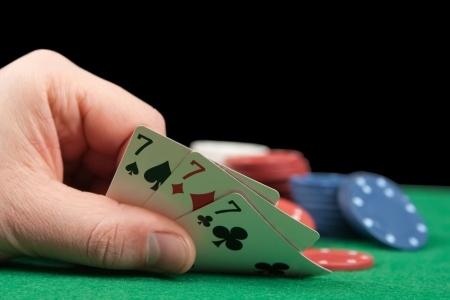Friday the 13th, 2015
Friday the 13th is almost here! Did you know that in 2015, there are three Friday the 13ths?
The following information is taken from the Psychic Library Superstition Room.
There is a term for a fear of the number 13 ? triskaidekaphobia, of Greek origin. The term for a fear of Friday the 13th is paraskevidekatriaphobia.
Across many cultures, the belief that the number 13 is evil and brings bad luck is so strong that many hotels, office and apartment buildings do not have or recognize a 13th floor, airports usually do not have a 13th gate and many people stay home on Friday the 13th.
The Chinese and ancient Egyptians believed the number 13 brings good fortune. The Egyptians believed in 12 stages in life toward spiritual enlightenment. The 13th stage was the eternal afterlife. In this sense, death was not a place of fear, but a place of high regard for the afterlife.
One theory about why this negative belief about the number 13 exists is that Judas, who betrayed Jesus, was the 13th person to be seated at the Last Supper.
In 1881, a group of New Yorkers set out to debunk this and all other superstitions and formed a group called the Thirteen Club. Its first meeting took place on Friday the 13th at 8:13 pm and 13 people sat down to dinner in room number 13. To get into the room each guest walked under a ladder and sat down around piles of spilled salt. Needless to say, all of the guests survived. For the next 40 years, Thirteen Clubs cropped all over the U.S., but then faded from popularity.
It is believed that because some people do not fly, invest or even leave the house on Friday the 13th, there is a notable loss in business transactions.
To find out about other superstitions, visit the Superstition Room.
![]()
Read More »
Lucky Number Seven
Numerous references to the number 7 are found throughout history ? in religions, cultures and ancient civilizations. The number seven is most often associated with good luck. It is believed that the importance of the number seven began in ancient times. During that time, before the invention of the telescope, only seven planets were visible in the skies ? the sun, the moon, Mercury, Venus, Mars, Saturn and Jupiter. This may explain why many ancient cultures adopted seven gods or deities.
?
The ancient Greeks thought the number seven to be extremely lucky. Pythagoreans considered the number seven to be a perfect number. There were seven ancient Roman and Egyptian Gods. Hinduism recognizes seven major chakras (energy centers in the human body). The Arabs built seven holy temples. In Japanese tradition, there are seven lucky gods that bring good fortune. There is also a belief that seven ancient Buddhas existed.
?
References to the number seven appear many times in the Bible (Old Testament). For example, God created the world in six days and the seventh day was the Sabbath or day of rest; King Solomon?s temple took seven years to build; every seven years is considered a holy year in the Hebrew Torah; Israelites during the battle of Jericho were told that marching around the walls of the city seven times would ensure their victory and its walls would come tumbling down; the Kaballah seven-knot, red-string bracelet to protect from the evil eye and negative thoughts; and in Jewish tradition, the deceased are mourned for seven days, which is known as sitting shiva (shiva literally means seven). As far as the Christian Bible (New Testament), examples of the number seven are abundant: seven seals in Revelations; seven sacraments; seven stars; seven deadly sins; seven last plagues; and seven heavenly virtues.
?
Even to gamblers the number seven is lucky. Three sevens make a blackjack, a big payout on a slot machine and a winner in the game of craps. The opposite sides on dice add up to seven. On July 7, 2007, the casinos were full up, as hopefuls tried to beat the odds on this lucky date of 07/07/07.
?
The number seven has been, and still is, universal. Here are more some examples: seven wonders of the world, seven seas, seven continents, seven hills of Rome, seven notes in a musical scale, the seventh inning stretch at a baseball game, seven colors in a rainbow, seven spots on a ladybug (always a good-luck symbol), seven days of the week, the seven-year itch and Snow White?s seven dwarfs. Also, it is believed that the seventh child of a seventh child will be psychically gifted.
?
For the most part, the number seven is associated with good luck. However, in the Chinese culture it symbolizes death. Also, breaking a mirror is thought to bring seven years of bad luck. This superstition may have stemmed from the Romans who believed that people underwent a physical and spiritual regeneration every seven years and that the mirror was a reflection of the soul. Thus, when a mirror is broken, the person?s soul would have to wait seven more years for regeneration. However, given the examples listed here, it is almost a sure thing that the number seven is a lucky, protective and positive symbol for most people.
TO LEARN MORE ABOUT OTHER SUPERSTITIONS,
PLEASE VISIT THE SUPERSTITION ROOM.
TO LEARN MORE ABOUT THE BROKEN MIRROR SUPERSTITION,
CLICK HERE.
![]()
Read More »
Seeing a Hearse Go By
The hearse is a most notorious icon of death and mourning. Numerous superstitions, gestures and beliefs are connected to this vehicle. Just the mere sight of a hearse can stir up many emotions about our own mortality.
Since the time of horse drawn hearses, a common belief was that if you saw a hearse, you would be the next to die. To avoid such a horrible curse, in Victorian times, it was believed that holding a button could ward off this demise. Others held a button until they saw a bird. Some people would go as far as to hold their breath, close their eyes and put their feet up in the air.
Another old belief is that a hearse drawn by two horses (especially white ones) signified a death would happen in the neighborhood in the very near future.
One of the more interesting traditions about hearses passing by is taken from Japanese culture. Hiding one?s thumb in a fist while the hearse passed was done to protect the parents from an early death. (The thumb is a representation of the ?parent? finger, called ”oya yubi” in Japanese.)
Another superstition is based on which direction you see the hearse moving. If the hearse is moving toward you and empty, it is considered good luck in some parts of the United States. In other areas of the U.S., it could bring on three days of good or bad luck. On the other hand, if a hearse is empty and moving away from you, you are close to death.
Some people believe that if they see their reflection in the window of a hearse, it is a bad sign. No matter what, a hearse is the sign of imminent death. Most people have some type of superstitions about seeing one, and most of us will be unable to avoid being the passenger in one way or another. And by the way, you don?t ever want to be the first person to drive a brand new hearse ? it is definitely bad luck.
To find out about other superstitions,
visit the Superstition Room.
?
![]()
Read More »






